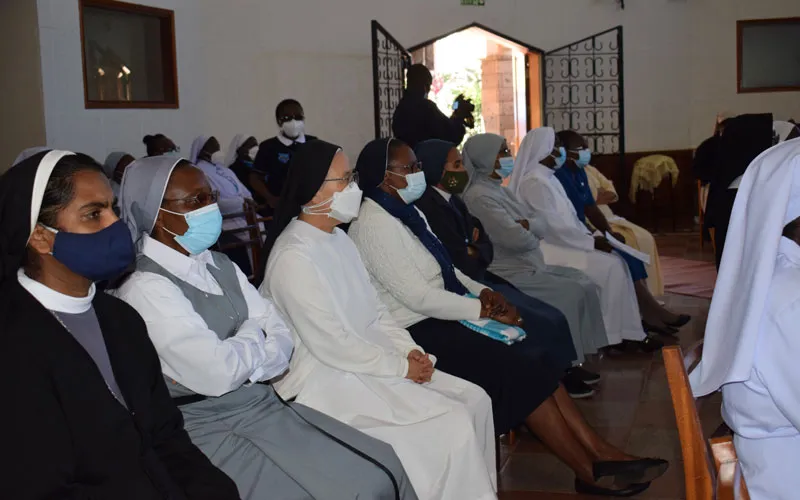 Credit: ACWECA
Credit: ACWECA
Additionally, the Hilton-Hekima Scholars Program provides theological training to Sisters across Africa to strengthen Consecrated Life and has also facilitated the setting up of data centers in Africa that will be used to collect, store, process, and allow the sharing of information about Catholic Sisters on the continent.
Sr. Wakahiu says that the newly launched Hilton-Hekima Scholars Program has 170 Sisters enrolled to study Theology virtually across Africa.
To provide continued education, Hilton Foundation has a solid network with the African Sisters Education Collaborative (ASEC) to provide opportunities for higher education and leadership development to Sisters.
The Catholic Nun who has previously served as ASEC Executive Director notes that Hilton Foundation has also created the Sister Led Youth Empowerment Initiative (SLYEI) to support underserved families.
(Story continues below)
SLYEI operates in Kenya, Uganda, Ghana, and Zambia to connect all vocational institutions operated by Catholic Sisters in these countries to provide skills development for youth for increased self-sufficiency by connecting youths to jobs so they can lead a life of self-sufficiency, Sr. Wakahiu says.
The foundation has also expressed a continued commitment to the Talitha Kum network that fights human trafficking and restore its victims to their communities.
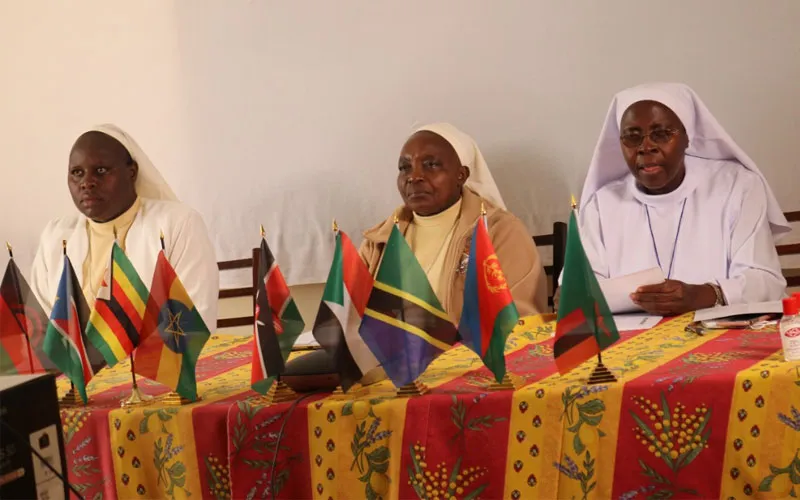 From left; Sr. Pasilisa Namukoye, ÀOSK Executive Secretary, Sr. Mary Cecilia Njeri, ACWECA President, Sr. Hellen Badhiho ACWECA General Secretary. Credit: AMECEA
From left; Sr. Pasilisa Namukoye, ÀOSK Executive Secretary, Sr. Mary Cecilia Njeri, ACWECA President, Sr. Hellen Badhiho ACWECA General Secretary. Credit: AMECEA
The editor of the book, “Transformative partnerships: The role of agencies, Church and Religious Institutes in promoting strategic, social and sustainable change in Africa” told members of ACWECA that plans are in the advanced stage to support networks of Consecrated persons working to eliminate human trafficking within the African countries.
Another network that the Hilton Foundation hugely supports is the Bakhita Project, which is being implemented in Kenya, Zambia and Uganda in partnership with the Jesuit Conference of Africa and Madagascar and Associations of Sisterhoods, to provide scholarships and support young women completing their education.
Sr. Wakahiu says, in reference to the projects supported by the US-based foundation in Africa, “These issues cannot be solved by one Congregation. We have to work together for the common good of our society, and for effective social change.”
She says that the COVID-19 pandemic, which she says does not know boundaries has created “a wilderness of pain and struggle across the world.”
“We have all listened to the stories of horror: people dying without saying goodbyes to their loved ones, families in difficulties going hungry, some now homeless because they could not pay mortgages, with escalating healthcare bills consuming family savings,” she says.
She adds, “I have often wondered, how do we give hope to individuals, families, and communities severely impacted by the pandemic? How do we accompany and show compassion to the overwhelmed healthcare workers and people whose lives have been altered permanently because of the loss of their loved ones?”
Sr. Wakahiu says, in reference to the theme of the 18th ACWECA Plenary Assembly, “If we are to continue playing our prophetic role and ensure transformation in our institutes and communities where we minister, we must reevaluate our priorities and practices, particularly during this pandemic.”
The Catholic nun urged members of ACWECA to think about how they prioritize the poor, and how they work across boundaries to collaborate for the good of the mission.
“We all live charisms of love and compassion to each other and those entrusted in our care, and the time is now for us to be courageous and creative in our approaches as we continue our work in the missions. The lesson for all of us in the pandemic is that our ministries, our works, are stronger if we work together,” she says.
She underscored, “The pandemic has taught us that we cannot, we must not, work alone. We must be networked together because our collective knowledge, collective experience, and collective support produce a collective impact. We serve best when we serve together.”
In her August 26 presentation, Sr. Wakahiu further urged Religious Sisters to also take care of their own well-being even as they channel their efforts towards caring for others.
She said that just like everyone else, Catholic Sisters have been hugely impacted by the COVID-19 pandemic, which has taken away their community members and their sources of livelihood.
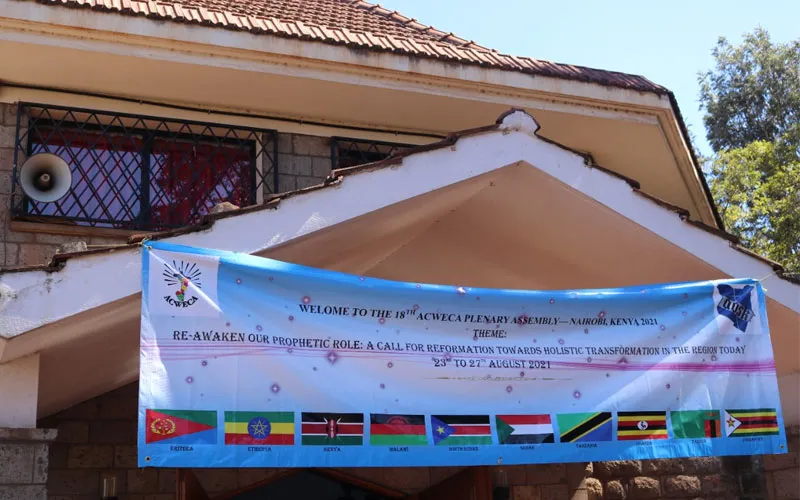 Banner announcing the 18th Plenary Assembly of Consecrated Women in Eastern and Central Africa (ACWECA). Credit: AMECEA
Banner announcing the 18th Plenary Assembly of Consecrated Women in Eastern and Central Africa (ACWECA). Credit: AMECEA
“While we are called to go to the periphery, we also have to look inside our institutes. We, Catholic Sisters, have been impacted by the pandemic too. Our communities have lost Sisters who were working on the frontlines as healthcare staff, our elderly Sisters have died, and many of our ministries remained closed during the lockdown, so many Sisters could not provide services to people in need or minister to those suffering,” she said.
In her August 26 message, the LSOSF member encouraged her fellow Sisters to persevere during the harsh pandemic times, saying, “While we can focus on the negative impact of the pandemic, Prophet Isaiah challenges us to behold and be attentive to the new thing God is doing in us and around us.”
“We are invited to pause and recognize, ‘what will God spring forth in us, in our formation houses, in our communities and in our ministries.’ We will only be able to perceive this new thing if we look hard, listen and allow the spirit to lead us,” Sr. Wakahiu August 26.
Agnes Aineah is a Kenyan journalist with a background in digital and newspaper reporting. She holds a Master of Arts in Digital Journalism from the Aga Khan University, Graduate School of Media and Communications and a Bachelor's Degree in Linguistics, Media and Communications from Kenya's Moi University. Agnes currently serves as a journalist for ACI Africa.
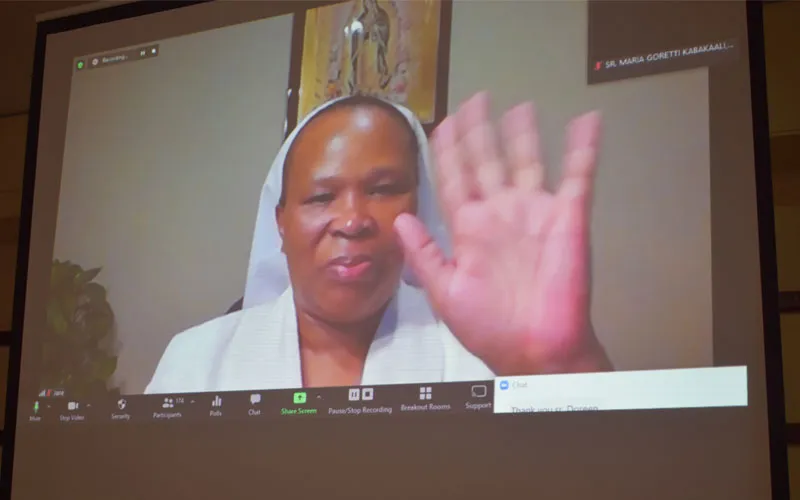 Sr. Jane Wakahiu during her presentation. Credit:ACWECA
Sr. Jane Wakahiu during her presentation. Credit:ACWECA


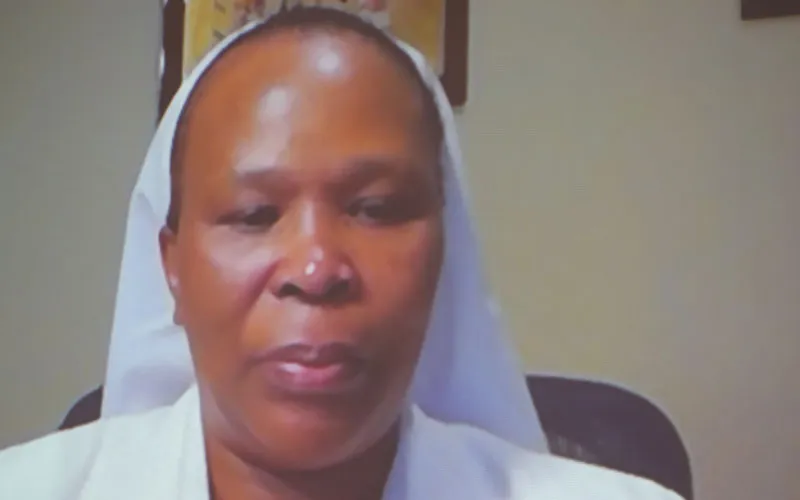
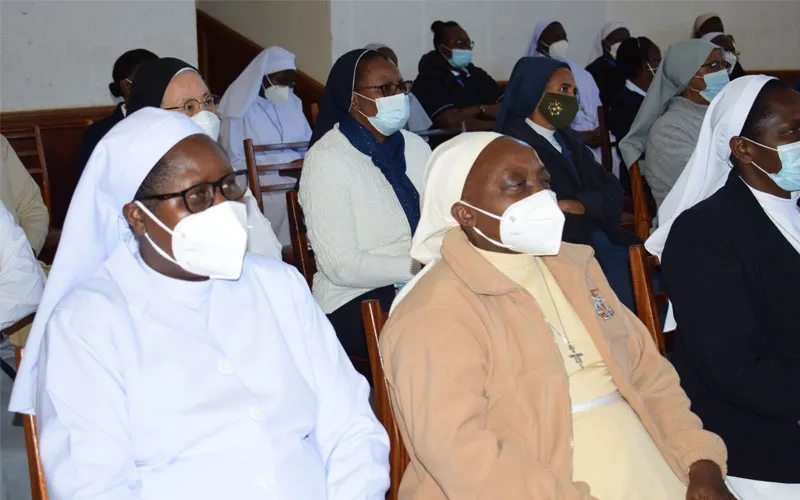 Credit: ACWECA
Credit: ACWECA
 Credit: ACWECA
Credit: ACWECA From left; Sr. Pasilisa Namukoye, ÀOSK Executive Secretary, Sr. Mary Cecilia Njeri, ACWECA President, Sr. Hellen Badhiho ACWECA General Secretary. Credit: AMECEA
From left; Sr. Pasilisa Namukoye, ÀOSK Executive Secretary, Sr. Mary Cecilia Njeri, ACWECA President, Sr. Hellen Badhiho ACWECA General Secretary. Credit: AMECEA Banner announcing the 18th Plenary Assembly of Consecrated Women in Eastern and Central Africa (ACWECA). Credit: AMECEA
Banner announcing the 18th Plenary Assembly of Consecrated Women in Eastern and Central Africa (ACWECA). Credit: AMECEA


